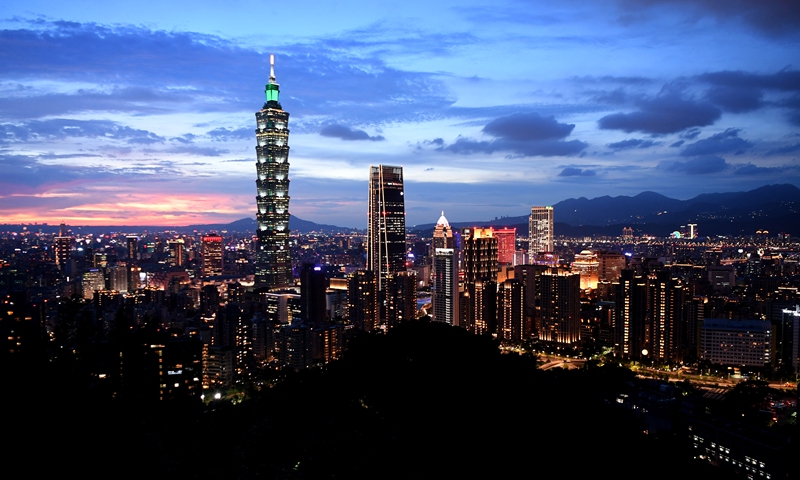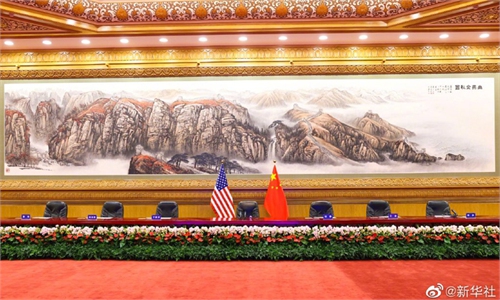
The night view of Taipei, Southeast China's Taiwan, June 20, 2019. Photo: Xinhua
A song, called "Go to Taiwan in 2035", goes viral online recently. While mainland netizens cheered about the words of the song, the green camp in Taiwan became anxious, as the "2035" in the lyric seems to suggest a looming reunification. The response from the mainland's Taiwan Affairs Office of the State Council was also telling."The song reflects the good wishes of people on both sides of the Taiwan Straits to realize the vision of the high-speed railway from Fujian to Taipei. I hope that the two sides of the Taiwan Straits will enjoy more convenient exchanges, more beautiful scenery and delicious food. I believe that this wish will certainly come true," said Zhu Fenglian, a spokesperson of Taiwan Affairs Office.
Another piece of news last week that a new bridge on a sea-crossing high-speed railway connecting the cities of Fuzhou and Xiamen in East China's Fujian Province was joined together also prompted people across the Straits to wonder if it serves as a technological experience for the high-speed train between the mainland and Taiwan.
The goal of national reunification pursued by China will eventually be achieved, if we see it through a historical lens. It is part of China's national rejuvenation process. Reunification is not only an unshakable objective, but also China's policy bottom line. The US has been keeping fanning flames in the Taiwan Straits, making high intensity conflicts more likely to happen. But an unexpected result for Washington is that discussions about post-reunification governance across the Straits have increasingly begun to emerge.
Experience that Taiwan island may want
Liu Junchuan, a deputy head of The Taiwan Affairs Office, said in late October said that the island's post-reunification revenue should all be spent on improving the wellbeing of its residents. This has triggered the latest round of hot discussions from both the mainland and Taiwan about post-reunification governance in Taiwan.
Reunification is far from something scribbled on an old scrap of paper. Rather, it spans across a spectrum of areas, from politics and military to social lives. Liu's words echoed the essence of the mainland's governance - it lays emphasis on people's livelihoods and social conflicts and associates economic development with peoples' wellbeing. This is the characteristic of socialism in China.
The mainland has accumulated a great deal of social governance experience that can be applied to Taiwan. It could serve as a role model for industrial transformation and in regulating house prices. The concept of "common prosperity" can serve as a guiding principle to ensure the livelihoods of the people of Taiwan.
Tian Feilong, an associate professor of law at Beihang University, told the Global Times that the high-tech sector can be one area that the mainland could participate in.
"The mainland can support Taiwan island to set up an international innovation center, helping it become the center of the global chip industry. Huawei can also join in the establishment of the center. This means a vast number of job opportunities for young people," said Tian.
Reunification is now a buzzword among netizens from Taiwan, and some are seeing the real benefits it is likely to bring. A post on PTT, one of the largest web forums in Taiwan, listed the benefits: People from Taiwan will not have an identity problem and will not debate their identity which is only liable to split society; militarily, it will be protected by the motherland, and military spending can be used to develop the economy.
Taiwan's future lies with the mainland
The DPP authority has focused all its attention to fueling political agendas, rather than fixating on economic development and public interests. This has led to various social woes in Taiwan. Another example of Taiwan authorities' governance failure is its politicization of COVID-19 vaccination. DPP authority lambasted the mainland's vaccine goodwill, while its locally manufactured Medigen vaccine is only recognized by two countries around the world, according to media reports. Some Taiwan netizens accused the DPP of placing politics above science.
The island of Taiwan has no future other than that of reunification with the Chinese mainland, and it has no international legal status other than that of being part of China, Chinese State Councilor and Foreign Minister Wang Yi said in late October.
He talked about it from a political point of view. It is also true from the societal level.
Li Xiaobing, an expert on Hong Kong, Macao and Taiwan from Nankai University, told the Global Times that the biggest worry of the public in Taiwan is that they see no hope and are anxious about Taiwan's future.
"Cross-Strait relations may go downward at any time due to the manipulation of secessionist forces, in addition to the pandemic and behind-the-scenes US maneuvers, which will deal a heavy blow to many industries. In the end, it is the public that has to bear the cost," said Li.
Meanwhile, the island cannot offer many development opportunities for the young people, Li added.
The mainland is open. Many industries in developed areas, especially the Greater Bay Area, can connect with those in Taiwan. Taiwan industries can take advantage of the developmental momentum and opportunity of the mainland, instead of being locked in the limited market and space of a small island.
Why now?
Zhang Hua, an assistant research fellow at the Institute of Taiwan Studies, Chinese Academy of Social Sciences, believes that discussions on post-reunification governance send a strong message: The mainland is prepared for reunification.
The mainland recently announced specific measures to punish diehard secessionists from Taiwan, which Zhang said is paving the way to hold them accountable after reunification.
"Discussions of post-reunification governance can prove to be very effective in deterring secessionist forces," Zhang told me.
The mainland has both the will and strength to govern. When it was poor, it did not have the resources or means to pursue reunification. But now, it is able to not only pursue but also achieve the goal. Meanwhile, it has the ability to govern Taiwan well.
Such ability can become concrete policies, economic interests and striking capabilities. These are all governance. Let's talk about post-reunification governance now, rather than until reunification.
The author is an editor with the Global Times. wangwenwen@globaltimes.com.cn


